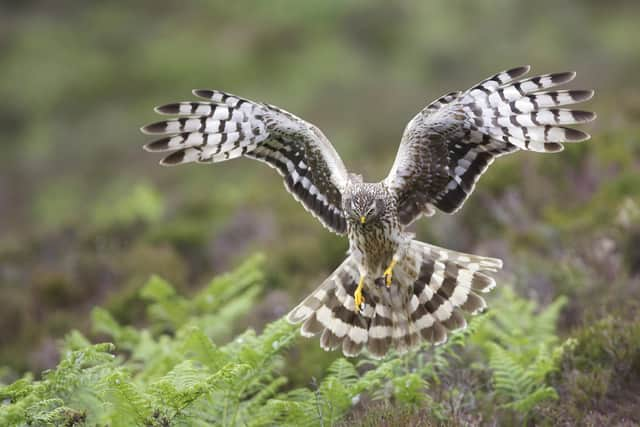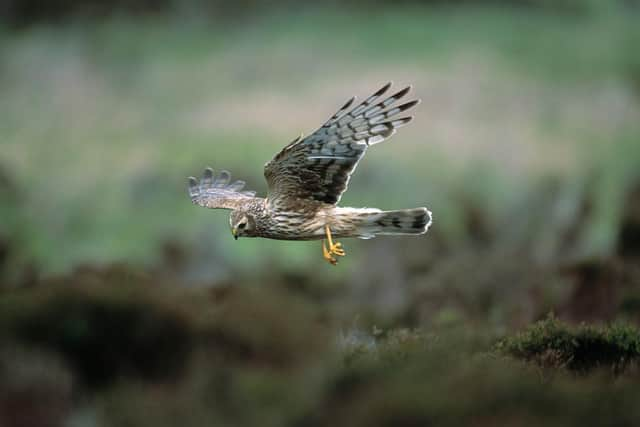Birdcrime report reveals Hen Harriers and White-tailed Eagles amongst victims of illegal persecution
This article contains affiliate links. We may earn a small commission on items purchased through this article, but that does not affect our editorial judgement.
and live on Freeview channel 276
Amongst the victims are Buzzards, Red Kites, Goshawks, Hen Harriers, Peregrine Falcons and White-tailed Eagles. All these species are protected by laws designed to help our rarest and threatened species. There is clearly no place for such crimes against some of our best loved species.
The report documents that Hen Harriers, a red listed species, are being relentlessly targeted, particularly in areas dominated by driven grouse moors. Since January 2022, RSPB and Natural England data reveals that 39 Hen Harriers have been confirmed killed or have ‘suspiciously disappeared’ across the UK, with eight satellite-tagged birds being persecuted or disappearing in suspicious circumstances in the same area near Birkdale in North Yorkshire alone.
Advertisement
Advertisement
Two of the most shocking incidents recorded against Hen Harriers include a Natural England satellite-tagged bird called Free which had its head pulled off while still alive, and four Hen Harrier chicks that were trampled to death in a nest being monitored by Natural England. The report reveals that one RSPB tagged Hen Harrier named Dagda was found shot dead in May 2023 on a grouse moor at Knarsdale, next door to the RSPB nature reserve at Geltsdale on which it was breeding. It is unknown who shot the bird, but the supporting tag data is clear in documenting where and when this incident took place. A recent peer-reviewed study by the RSPB found that survival of tagged Hen Harriers in the UK was very low, with birds living on average for only four months. As much as 75% of annual mortality of tagged birds was due to illegal killing associated with grouse moor management. If this relentless killing continues, the future of these rare and threatened birds remains at serious risk in the UK.


The report also highlights the significant case of a young White-tailed Eagle from the UK Government licenced re-introduction scheme on the Isle of Wight, which was confirmed poisoned on a shooting estate in West Sussex. This was the first case of this species being illegally killed in England since their extinction due to persecution in the 18th Century. On the same estate, three days after the eagle died from ingesting a banned poison, a Labrador dog suffered the same fate after ingesting the same pesticide – Bendiocarb. Frustratingly the police investigation failed to hold anyone to account for these crimes.
There were two successful convictions for raptor persecution crimes in 2022, with both individuals being gamekeepers. Disappointingly, in one case, where multiple birds of prey were shot or poisoned – the gamekeeper received a 200-hour community order and was ordered to pay just £1,200 in fines, costs and compensation. As this case highlights, existing wildlife protection laws are failing to protect birds of prey, acting neither as a deterrent nor as an appropriate punishment for the crimes committed.
This latest report, alongside peer-reviewed papers, intelligence and data from wildlife crime incidents continues to affirm that raptor persecution is frequently linked to land managed for gamebird shooting. Evidence shows on some shooting estates birds of prey are deliberately targeted to reduce potential predation on gamebird stocks and sometimes also to reduce disturbance to these quarry species on shoot days. The RSPB continues to call for the licensing of grouse shooting in England, and following such measures now being introduced by the Scottish Government, to provide a meaningful deterrent to the illegal killing of birds of prey.
Advertisement
Advertisement
RSPB chief operating officer, James Robinson said: “Sadly, once again, the report documents the shameful illegal killing of rare and vulnerable birds of prey, an important part of our natural heritage.


“Given the correlation in location between birds of prey persecution and land under game management, the RSPB is calling for greater regulation of shooting, in particular intensive forms of grouse shooting.
“A Bill to introduce licensing of grouse moors in Scotland to stop raptor persecution is now moving ahead and we need a similar response in England.”
If you notice a dead or injured bird of prey in suspicious circumstances, call the police on 101 and fill in the RSPB’s online reporting form: https://www.rspb.org.uk/birds-and-wildlife/advice/wild-bird-crime-report-form/.
If you have information about anyone killing birds of prey which you wish to report anonymously, call the RSPB’s confidential Raptor Crime Hotline on 0300 999 0101.